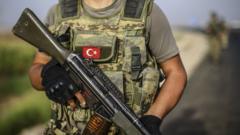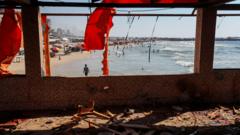The Kurdish liberation movement's shift to politics rather than arms has evolved significantly over the past few decades, and its latest disarmament process promises to reshape regional dynamics.
**Kurdish PKK Begins Disarmament, Signaling Hope for End to 40-Year Turkey Conflict**

**Kurdish PKK Begins Disarmament, Signaling Hope for End to 40-Year Turkey Conflict**
The Kurdish PKK's disarmament marks a pivotal moment in Turkey's long-standing struggle for peace.
The outlawed Kurdish Workers' Party (PKK) is set to commence a historic disarmament process on Friday, signaling a potential resolution to the 40-year conflict between the group and the Turkish state. The ceremony to symbolize the laying down of arms will take place in Iraqi Kurdistan, with a heavy security presence expected, although exact details remain hidden for safety concerns. Turkish President Recep Tayyip Erdogan has hailed the decision, claiming it liberates the country from a longstanding burden.
The disarmament initiative comes in the wake of a long and brutal conflict that has claimed around 40,000 lives since its inception in 1984. The PKK is classified as a terrorist organization by Turkey, the U.S., the EU, and the UK. Despite this designation, the group has maintained substantial support, particularly for its imprisoned leader Abdullah Ocalan, who has been in solitary confinement since his capture in 1999. Just prior to this disarmament announcement, Ocalan articulated a message urging the PKK to transition from armed confrontation to democratic dialogue.
Following the symbolic laying down of arms, the disarmament will extend across multiple months with oversight from the Turkish government, the Iraqi government, and the Kurdistan regional authority. In his first public appearance in years through a video message, Ocalan emphasized the importance of political engagement over violence, stating, "I believe in the power of politics and social peace, not weapons."
The current negotiations mark another chapter in a marginal history of peace attempts, notably a fragile ceasefire established in 2013 that ultimately fell apart in 2015, resulting in widespread violence. The renewed call for peace follows a growing sentiment to seek autonomy within Turkey rather than a full independence, which has evolved since the PKK's founding.
Erdogan has expressed optimism about this development, seeing it as a chance to dismantle the turmoil caused by previous violence. However, concrete decisions on future steps will be postponed until the Turkish parliament reconvenes postsummer recess. Additionally, the fate of Ocalan remains clouded; although there have been discussions regarding reviewing his imprisonment conditions, any tangible outcome will depend on later stages of the peace process.
For Erdogan, this peace process could parallel future political aspirations, especially with ongoing constitutional reform discussions. Sessions in parliament will determine the implications for a possible re-election bid in 2028, amidst a backdrop of significant political maneuvering as the government seeks pro-Kurdish support.
The disarmament initiative comes in the wake of a long and brutal conflict that has claimed around 40,000 lives since its inception in 1984. The PKK is classified as a terrorist organization by Turkey, the U.S., the EU, and the UK. Despite this designation, the group has maintained substantial support, particularly for its imprisoned leader Abdullah Ocalan, who has been in solitary confinement since his capture in 1999. Just prior to this disarmament announcement, Ocalan articulated a message urging the PKK to transition from armed confrontation to democratic dialogue.
Following the symbolic laying down of arms, the disarmament will extend across multiple months with oversight from the Turkish government, the Iraqi government, and the Kurdistan regional authority. In his first public appearance in years through a video message, Ocalan emphasized the importance of political engagement over violence, stating, "I believe in the power of politics and social peace, not weapons."
The current negotiations mark another chapter in a marginal history of peace attempts, notably a fragile ceasefire established in 2013 that ultimately fell apart in 2015, resulting in widespread violence. The renewed call for peace follows a growing sentiment to seek autonomy within Turkey rather than a full independence, which has evolved since the PKK's founding.
Erdogan has expressed optimism about this development, seeing it as a chance to dismantle the turmoil caused by previous violence. However, concrete decisions on future steps will be postponed until the Turkish parliament reconvenes postsummer recess. Additionally, the fate of Ocalan remains clouded; although there have been discussions regarding reviewing his imprisonment conditions, any tangible outcome will depend on later stages of the peace process.
For Erdogan, this peace process could parallel future political aspirations, especially with ongoing constitutional reform discussions. Sessions in parliament will determine the implications for a possible re-election bid in 2028, amidst a backdrop of significant political maneuvering as the government seeks pro-Kurdish support.




















